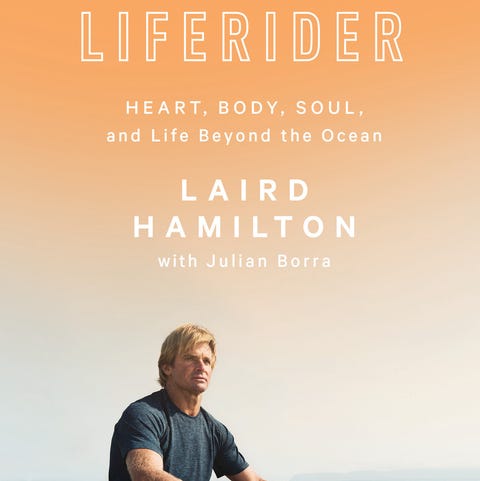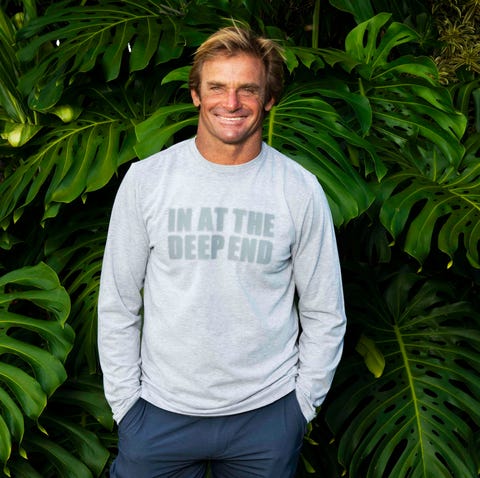How Fitness Icon Laird Hamilton Stays in Shape at 55
At 55 years old, Laird Hamilton has evolved into much more than a big wave surfer and fitness icon—entrepreneur, author, trainer, superfood scientist—and his latest book, Liferider: Heart, Body, Soul, and Life Beyond the Ocean delivers hard-earned wisdom in all of the above. Some things never change: Hamilton will always be a guy who hates wearing shoes and a shirt, and who seeks out discomfort in the name of self-improvement. But over the years the father of three has also found ways to deliver the Laird lifestyle to the masses, becoming an unlikely business mogul in the process.
Hamilton has created a line of standup paddleboards that will withstand epic ocean crossings and metal-infused clothing that can withstand brutal outdoor workouts. After years training—and transforming—some high-profile clients such as music producer Rick Rubin, he launched XPT (Extreme Performance Training), a program largely based around what he calls “our ability to adapt”, as well as a line of innovative Superfoods. Which makes sense because, at the end of the day, if there’s one thing we can all learn from the guy who basically invented surfing 50-foot walls of water — and who still does it past the half century mark — it’s how to be fit, fearless, and focused. Here, Hamilton breaks it down in 10 simple Laird-isms.

1. Music is an Essential Workout Tool
Hamilton’s new book opens with a quote from the pop-punk band Green Day, and he later writes that music “opens up new channels and reroutes energy.” It’s pretty clear that sound plays a huge role in the rhythm of his life and his workouts. “Sound is an enormous part of energy and movement and music can become as essential as hydration,” he explains. “You can use music to wind you up and get you going, or to help sustain — I use it a lot for endurance type stuff — or even to help you drift off. Hamilton does admit there is a time and a place for tunes: “Doing something like riding giant surf, it can be a distraction.”
2. Saunas are the New Ice Bath
Not long ago, some studies coming out of Finland alerted Hamilton to the benefits of heat in aiding recovery and he’s been adding sauna sessions to his workouts ever since. He now prefers it over ice. “Sure, we gravitate to ice because it’s more pleasurable,” he says. “If you’ve been running around and you’re hotter than snot and feeling beat up, you’re like ‘yeah numb me’”. But Hamilton learned that the hormones you produce in heat are actually more conducive to recovery. “All my boys and I hit the sauna for at least 15 minutes after we train.”
3. Burpees and Headstands Are “Perfect” Movements
Laird Hamilton has tried thousands of different exercises and even invented quite a few. While he says he loves any exercise that “reflects natural movement patterns”, there are two moves that were essential to him when he started out and will remain essential the rest of his life: Burpees and headstands. “I like combining a burpee with a hindu squat [in which your arms swing while lowering] and a pushup — those have been around since Genghis Khan,” he says. And while Hamilton says any type of inversion is important, he likes plain old headstands. “Inversion is phenomenal, even if it is just for minutes at a time,” he explains. “In fact, if you can’t be inverted for minutes at a time then I would question the functionality of your circulation.”
4. We Are Meant to Feel Fear
In Liferider, Hamilton delves into the balancing power of death. “If you make it so nothing’s dangerous and there is no death, how does life feel?” he asks in the book. Of course, Hamilton’s perception of risk is vastly different than the rest of us, but he feels it should still always play a part in our workouts and in our lives. “Even if it’s just mountain biking a little faster than normal, or into conditions that are a little more slippery, that moment of alertness is really important,” he says. “That emotion and chemical reaction is very good for our health — we were meant to experience that.”

5. Breathing Right is Everything
Breath control is not just for surfers. In Hamilton’s elite training program, XPT, he always points out the connection between the heart and the lungs, and up to two thirds of XPT training is cardio based. He says that most of us are under-oxygenated, most of the time. “First, we try to get people to understand that the nose is the breathing instrument of the body, not the mouth,” says Hamilton. “We had been breathing through our noses for thousands of years and only in the last 200 years, we stopped. When you use your mouth you scrub your CO2 and absorb less oxygen.” Hamilton recommends regulating your workout effort according to your ability to breath through your nose. “The ultimate thing is to become more tolerant to CO2, which means that you’ll be able to run faster and breathe less — you’ll be more efficient.”
6. Coffee Can Be a Performance Enhancing Drug — If Done Right
“Going back 20 years, I was drinking espresso with ghee [clarified butter that originated in India],” says Hamilton. “I’ve always had this fascination with combining good coffee with good fat.” Hamilton’s fascination has to do with harnessing the energy-boosting effects of caffeine, but as a slow drip. After years of experimenting — and with the help of his partner Paul Chek — he came up with the ultimate coffee creamer that he now sells through his superfood company. “When caffeine and the right fat bonds, you’re time releasing the caffeine, but also feeding the brain,” he explains. “It’s a perfect combination — focused sustained energy with no crash, and you’re satiated.”
7. Meditation Doesn’t Have to Be Mellow
When it comes to meditation — something Hamilton has long promoted — he recommends not getting hung up on things like sitting still or serenity. For Hamilton, meditation is anything that “focuses the mind”. In fact, any time you are in what he calls flow — which can even happen during exercise — you could be in one of the highest forms of a meditative state. “It’s called active meditation and it could actually happen during a super intense situation,” says Hamilton. “It’s about the ability to shut everything else out and bring us to a state of presence.”
8. Take Your Workout Outside, Whenever Possible
In his new book, Hamilton notes that “moving through nature triggers deep mechanisms that control stress and regulate heart performance”. As one of the most famous watermen on the planet, it’s no wonder Hamilton believes in the power of nature while pushing ourselves. Hamilton points to things like better oxygenated air near trees and the fact that green has been found to be a soothing color. However, he says it’s even more primal than that. “It’s where we’re from,” he says. “Just being barefoot on natural ground, grounds us electronically.”
9. Food is Fuel
Long before Hamilton created Laird Superfood, he had some pretty strong feelings about how we should be eating to optimize performance. He admits that his rules of thumb are not all his own, but he has curated the wisdom of others over decades to zero in on the eating habits that match his incredible output. “Stay away from white sugar, white milk, and white flour, and if you can’t pronounce it, don’t eat it,” he says. And if you’re really active, Hamilton suggests you always look at food as fuel, and then to match that fuel to the time and intensity of a workout. However, he does caution against relying on a regular diet alone for all the nutrients you need: “We have to seek out ways to find the nutrients we’re not getting because food is simply not being grown the way it used to.”
10. Working Out is Not Optional
“Anything that has to do with your health and wellness should be a lifestyle,” he says. “Don’t do things for a few months — make it the way you live.” Hamilton says this goes fr the way we eat as well. With all the fleeting exercise fads that come our way, he says the ultimate test of whether a workout is good or not is whether it can be done at any age. “If a kid can’t do a version of the workout, and if older people can’t do a version of the workout, then I would quit — I would question the validity of it,” he says.
Source: Read Full Article